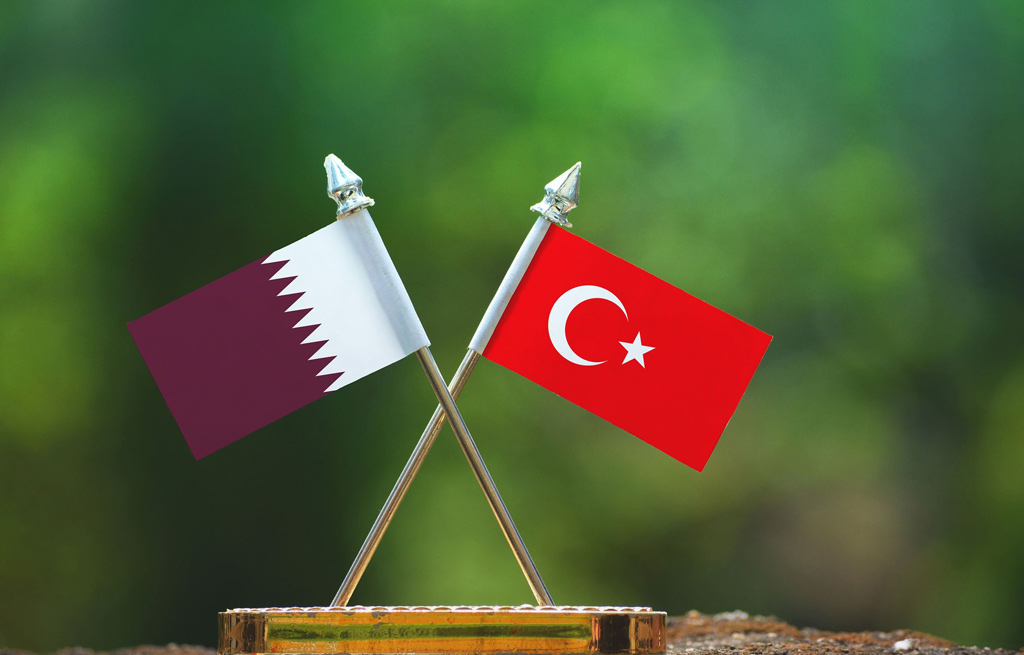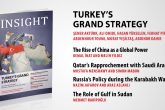President Recep Tayyip Erdoğan recently visited Doha to attend the seventh meeting of the Turkey-Qatar Supreme Strategic Committee. The first six meetings resulted in 62 agreements and six joint statements. This week’s meeting, in turn, consolidated the strategic partnership between those nations, which has reached a whole new level since the 2017 blockade. As such, it was hardly surprising that Turkish and Qatari officials exchanged views on the management of Kabul’s airport, strengthening bilateral cooperation in the defense industry, increasing their annual trade volume from $2 billion to $5 billion, the balance of power in the Eastern Mediterranean and Libya’s upcoming election.
Erdoğan’s visit to Qatar’s capital took place in the wake of three major developments. First, Turkey and the United Arab Emirates (UAE) have taken steps toward normalization, which was expedited by the visit of Abu Dhabi’s crown prince, Sheikh Mohammed bin Zayed Al Nahyan (MBZ) to Ankara and his decision to invest in Turkey.
Macron’s visit
Secondly, French President Emmanuel Macron just visited Saudi Arabia, the UAE and Qatar in an attempt to portray himself as a heavyweight in the international arena ahead of his country’s elections. Macron, who noticed the emerging power vacuum in light of Washington’s partial withdrawal from the region under the Biden administration, wanted to thank the Saudis for helping to resolve the crisis with Lebanon and selling weapons to the UAE, and thanked Qatar for evacuating French citizens from Afghanistan. Judging by the UAE’s decision to buy 80 Rafale jets for over $15 billion and the resignation of Lebanon’s information minister, who criticized Saudi Arabia’s involvement in Yemen, the French president got what he wanted. To be clear, neither Lebanon’s economic crisis nor Iran’s influence over that country seem to be things that Macron can possibly end. Moreover, it was not lost on anyone that the French president became the first Western leader to visit Saudi Crown Prince Mohammed bin Salman (MBS) since journalist Jamal Khashoggi’s murder.
Finally, UAE national security adviser Tahnoun bin Zayed Al Nahyan, the UAE crown prince’s brother, visited Tehran on Monday. For the first time since the “tanker crisis” of 2019, Abu Dhabi is pursuing rapprochement with Iran with the help of financial investments.
It remains to be seen to what extent the UAE will walk back its aggressive interventions in Yemen and Libya, but it is currently pursuing normalization faster than all other nations in the region. The country believes that taking bold steps now will be an advantage in the future, as others pursue normalization. As such, the UAE wants to repair its relations with Turkey and Iran, after having moved closer to Israel.
The arms sales
The emerging balance of power in the Gulf encourages normalization as well as new arms deals. It goes without saying that regional players lost a lot of blood in recent years by participating in proxy conflicts and competition. By putting tensions on hold and promoting cooperation, they can manage the uncertainty, which the global state of affairs deepens, and great power competition with greater ease. Still, the region remains devoid of order and suffers from “strategic chaos” and “confusion” due to the lack of clarity around relations among heavyweights. Certainly, the sale of additional weapons by European states, such as France, could not possibly serve to mitigate the rivalry between Iran and Saudi Arabia. Regional players will go over their strategic calculations depending on the outcome of nuclear talks with Iran.
Let us also keep in mind that Tehran’s drones, ballistic missiles and militias pose a significant threat to the Gulf states. At the end of the day, regional powers must pursue normalization by trying to identify their mutual interests in order to promote security and order in the Gulf. Needless to say, Turkey stands to make a positive contribution to the Gulf states as an advocate of stability and integration.
Turkey wants stronger relations with all Gulf states, which, it believes, is required by the emerging balance of power. Neither normalization with the UAE nor starting a new chapter with Saudi Arabia will have a negative impact on Turkey’s relations with Qatar, which it considers a strategic partner. Quite the contrary, those steps serve Qatar’s interests within the broader balance of power in the Gulf. Indeed, Ankara and Abu Dhabi have enough institutional memory (including the July 15, 2016 coup attempt and the 2017 blockade) to direct the differences between their respective national interests toward common strategic goals.



